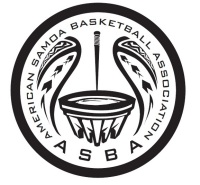FIBA secretary general in American Samoa on a 1-day visit
Article provided by Samoa News reporter, Fili Sagapolutele.
The upcoming Oceania basketball Under 19
championship scheduled for later this year in
Fiji and the ambitions of basketball federations
in the Pacific were among some of the issues
covered during a one-day visit to the territory
by David Crocker, the newly elected secretary
general of Oceania’s International Basketball
Federation, commonly known as FIBA.
Crocker, who is based in Australia, had visited
Fiji and Samoa before arriving in Pago Pago
Tuesday. Next, he heads to Papua New Guinea.
Crocker, the third person in more than three
decades to be elected to the Oceania FIBA secretary
general post, says the primary purpose of
the visit to the territory as well as other Oceania
FIBA member countries is to check on preparations
for the Under 19 tournament to be hosted
by Fiji from Dec. 1-8. “It’s going to be a tough
competition in Fiji” and Oceania federations are
being informed that they must be physically fit
and prepare for the tournament, Crocker told
Samoa News during his one-day visit, which
was his first time to the territory.
“Part of this visit is to come meet executives
of the federations, try and understand what their
plans are for preparing their teams for the Under
19,” he said and noted that other issues covered
during the visit is to connect with people on the
ground who run basketball in Oceania.
“And really try to understand what their
own ambitions are, what do they see as changes
to be done, and understanding what role we
might play to achieve those ambitions,” he said,
adding that he would discuss with the local federation
their ambitions before departing late
Tuesday afternoon.
Another issue covered is the “eligibility of
players” to represent their home country, he
said, adding that this is very important for all
Oceania members. “Eligibility is a big issue,
that’s why we’ve come to talk, to look at the
individual cases of athletes, because we want
athletes to play,” he said. “So, it’s important that
everyone is on a fair footing and that everybody
has only athletes who are eligible [to play]. We
want to give fair consideration to all cases.”
Samoa News asked, as to what type of consideration
FIBA would gives to an individual,
who was born in Samoa but have lived in American
Samoa since infancy and wants to represent
Am. Samoa. Crocker first pointed out that this
is a “very interesting question” and then added
that to check on eligibility, the first and foremost
document is the birth certificate, showing where
the person was born. He said FIBA also looks at
cases where a person has dual citizenship.
“So it can be complex, but we need to be very
precise where people have the right to represent
the country they want to represent,” he said.
He said FIBA also looks at school records,
or other records, which demonstrate where the
athlete has lived for a long period of time. He
emphasized that each case is reviewed carefully.
Samoa News shared with Crocker that ‘eligibility’
is a big issue when it comes to qualifying
athletes to represent American Samoa—for
example, a citizen of Samoa who was brought
to the territory while only a few months old.
That person, who has spent his or her entire
life in American Samoa couldn’t represent the
territory in games, due to being a citizen of Samoa.
Oceania’s International Basketball Federation
(FIBA) secretary general David Crocker
has emphasized the importance of Oceania federations
to partner with their National Olympic
Committees (NOCs), schools and governments
in order to further develop basketball in the
region.
Crocker, newly elected to the post, was in the
territory last week for the first time for a site visit
and meet with executives of the American Samoa
Basketball Association and other officials. He
also took time out during his 9-hour stay in the
territory for a Samoa News interview, after he
visited three other Oceania member countries.
He said that Oceania FIBA is taking a different
approach when it comes to its relationship
with its member countries “by understanding
what they want to help develop basketball in
their country and not what we want from them.”
Asked what type of resources — including
financial assistance — that is available to
American Samoa and other Oceania federations,
Crocker first pointed out that “we don’t
have a lot of money, but we have different types
of resources —people” available to assist each
Oceania federation.
For example, Crocker says that Oceania
FIBA has on their staff a former Olympian,
who is a development officer, and this individual
will soon meet with Oceania members
to discuss a number of issues and share some of
her experiences playing in regional and international
games.
Asked if the female development officer,
would make it easy for Oceania FIBA to develop
women basketball in the region, he responded
that this is “a big issue, having women participate
not only in the game but also officiating the
game and other matters. So it’s something that
we are conscious of.”
As part of his visit to the territory as well
as other Oceania member countries, Crocker also
inspects facilities, such as the basketball court at
Tafuna High School gymnasium used by ASBA.
He explained that facilities continue to be a
challenge for federations in Oceania.
For example, having access to the facility
when its time to play, and another challenge is
having quality venues because some facilities in
Oceania need improvement.
For the Tafuna High School court, he said
that the basketball rims had to be taken off
when there are no games and put back on when
there is a game. “This is a beautiful court — at
Tafuna High School — and the local federation
has made a great contribution into the redevelopment
and maintenance of it,” he said. “But it
still needs to go to the next level if basketball in
this country is to reach its potential.”
Asked specifically about the type of financial
resources available, Crocker said Oceania FIBA
has a couple of initiatives “that we run that
come into federations. One of them is a basketball
development officer program. Currently we
have ten development officers in the Pacific and
we partner with each Oceania member country,
the NOC or the federation itself of each country.
So the federation has some paid hands to do the
work, while the federation members and executives
focus attention on other matters.”
(Samoa News should point
out that executives and board
members of Oceania federations
all volunteer their time)
Asked if having a paid
development officer within a
federation will help to further
development basketball in the
region, Crocker first pointed
out that Oceania FIBA contributes
to the salary of the
paid officer, which means
“we don’t pay a full salary,
we make a contribution, so
it’s important that the NOCs
or the federations [of each
country] makes a contribution
as partner.”
“We also have a facility
grant program, again we look
to partner with NOCs and
local governments,” he said
adding that Oceania FIBA has
abut $25,000 a year for facility
development.
He emphasized that it’s not
easy to get funding from such
a grant because there must be
a “partnership” from member
countries as well as their governments,
ensuring that the
governments have access to
the facilities as well as the
federation.
“We add value where we
can. The NOCs, schools, governments
and other groups
may also get value with their
contribution as partners,”
he explained. “Part of our
arrangement [as a partner] is
that the federation have good
and unfettered access to
the facilities so that our investment
has good returns.”
Asked to make a comparison
between local basketball
facilities and those with other
Oceania countries that he has
visited, Crocker responded
that each Oceania member
country has different issues
dealing with facilities.
For example, some deal
with having access, others
it’s about the quality of the
facility, while with some, it’s
about maintaining the facility.
From his observation during
his brief visit here, Crocker
said, the local federation “is
contributing to the facility
issue — such as repainting
the floors, looking after the
condition of the facility, and
it’s something that I will share
with other federations as good
examples of contributing to the
community; and there is also
secure access to the facility.”
Equipment upgrade is
another part of the facility program,
but Crocker cautioned
that the facility must also
be in good condition and
maintenance must be included
in the plan.
He said he has seen facilities
in other countries, where
it’s a multiple facility, not just
basketball and there is a need
to keep good care of such
facility including keeping it
clean… It takes the effort of
everybody.”
“Again, it’s very important
that there is partnership
between the federation and
its local government, NOC
and other groups,” Crocker
stressed.










Comments
Comment Guidelines: The SportsTG Network is made up of players, families and passionate sports followers like you who have a strong opinion about sport. That's great - we want you to have your say and share your thoughts with the world. However, we have a few rules that you must follow to keep it fun for all. Please don't be rude, abusive, swear or vilify others. Apart from some pretty serious sport sanctions, we also can ban you and report you if things get out of hand. So play fair and have fun, and thanks for your contribution.